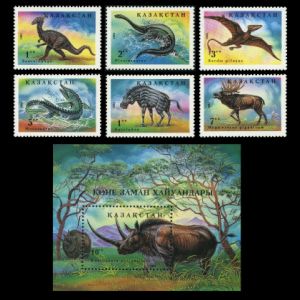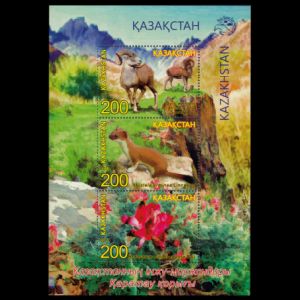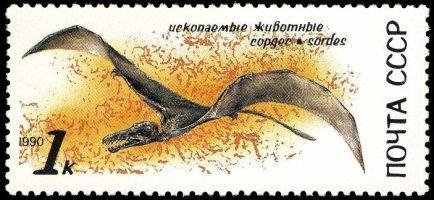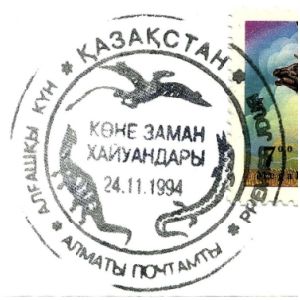the place where Paleontology and Paleoanthropology meets Philately
Kazakhstan
Dinosaurs and other prehistoric animals on stamps and postmarks of Kazakhstan
| << previous country | back to index | next country >> |
Contents:
- Country overview
- Philately of Kazakhstan
- Official stamps of Kazakhstan related to Paleontology
- Some other stamps of Kazakhstan to consider
- Commemorative postmarks of Kazakhstan related to Paleontology
- References
- Acknowledgements
Kazakhstan, officially the Republic of Kazakhstan, is a transcontinental country in northern Central Asia and Eastern Europe. Kazakhstan is the world's largest landlocked country, with estimated population of 18 million. Given its large land area, its population density is among the lowest, at less than 6 people per square kilometer. The capital is Astana, where it was moved in 1997 from Almaty, the country's largest city. Kazakhstan is the dominant nation of Central Asia economically, generating 60% of the region's GDP, primarily through its oil/gas industry. Kazakhstan has vast mineral resources. It shares borders with Russia, China, Kyrgyzstan, Uzbekistan and Turkmenistan. The country also borders a large portion of the Caspian Sea’s shoreline.
The terrain of Kazakhstan includes flatlands, steppe, taiga, rock canyons, hills, deltas, snow-capped mountains, and deserts.
The territory of Kazakhstan has historically been inhabited by nomadic groups and empires. In the 13th century, the territory was subjugated by the Mongol Empire under Genghis Khan.
The Russians began advancing into the Kazakh steppe in the 18th century and by the mid-19th century, they nominally ruled all of Kazakhstan as part of the Russian Empire.
Following the 1917 Russian Revolution, and subsequent civil war, the territory of Kazakhstan was reorganised several times. Kazakhstan was the last of the Soviet republics to declare independence during the dissolution of the Soviet Union in 1991. [R1]
Under the Soviet Union, the Kazakh SSR postal service was an integral part of the Soviet system. The republic was periodically recognized in sets of stamps honoring the different parts of the USSR. Kazakhstan became independent in December 1991 and wasted no time in organizing its own post. [R2]
Official stamps of Kazakhstan related to Paleontology: dinosaurs and other prehistoric animals
| 24.11.1994 "Prehistoric Animals" | ||
 |
|
|
Some stamps of Kazakhstan to consider: fossil sites
| 06.11.2017 "Karatau Nature Reserve" [A1] | ||
 |
|
|
Notes:
[A1] Karatau Nature Reserve is a wildlife refuge in the mid-part of the Karatau Mountains, near Kyzylkum, Betpak-Dala and Moiynkum deserts in the South Kazakhstan Region of Kazakhstan, in Central Asia.
The reserve was founded in 2004 and has a territory around 34 300 ha. Some 700 species of plants constitute its flora, 62 species are endemic.
"Karatau Jurassic lake" located on the territory of the Reserve. Fossils of many Jurassic animals and plants were discovered at this site for the first time at the middle of 19th century. [R3}
One of unique fossils found in the site is a pterosaur Sordes pilosus, from the family Rhamphorhynchidae.
 |
| Reconstruction of Sordes pterosaur on stamp of USSR 1990, MiNr.: 6116, Scott: 5920 |
The genus was named in 1971 by the Soviet paleontrologist Aleksandr Grigorevich Sharov.
The holotype of Sordes pilosus shows remains of the soft parts, such as membranes and hair.
The wing membrane, of the pterosaur, was supported not only by the fingers, but also by the legs.
This was the first unequivocal proof that pterosaurs had a layer of fur.
The integument served as insulation, an indication the group was warm-blooded, and provided a streamlined flight profile. [R4}
Commemorative postmarks of Kazakhstan related to Paleontology: dinosaurs and other prehistoric animals
Legend is here| 24.11.1994 "Prehistoric Animals" [FDC] | ||
 |
|
|
References:
- [R1] Kazakhstan:
Wikipedia,
WikiTravel,
FlagCounter.
- [R2] Postal History and Philately of Kazakhstan:
Wikipedia,
Links to official website of the Post Authority, stamp catalog and a list of new stamps of Kazakhstan are here - [R3] Karatau Nature Reserve: Wikipedia, official website (in Russian and Kazahstanian), "JURASSIC LAKE OF KARATAU: THE PRESENT STATE OF THE UNIQUE LOCATION OF THE FOSSIL FLORA AND FAUNA" (in Russian),
- [R4] Sordes:
Wikipedia,
Sharov, A. G. 1971. "Noviye letayushchiye reptilii is Mezozoya Kazakhstana I Kirgizii". Trudy Paleontologicheskii Institut, Akademiya Nauk SSSR 130:104–113. Translated by Konstantin Rybakov, 2021.
Acknowledgements:
Many thanks to Dr. Peter Voice from Department of Geological and Environmental Sciences, Western Michigan University, for reviewing the draft page and his valuable comments.
| << previous country | back to index | next country >> |